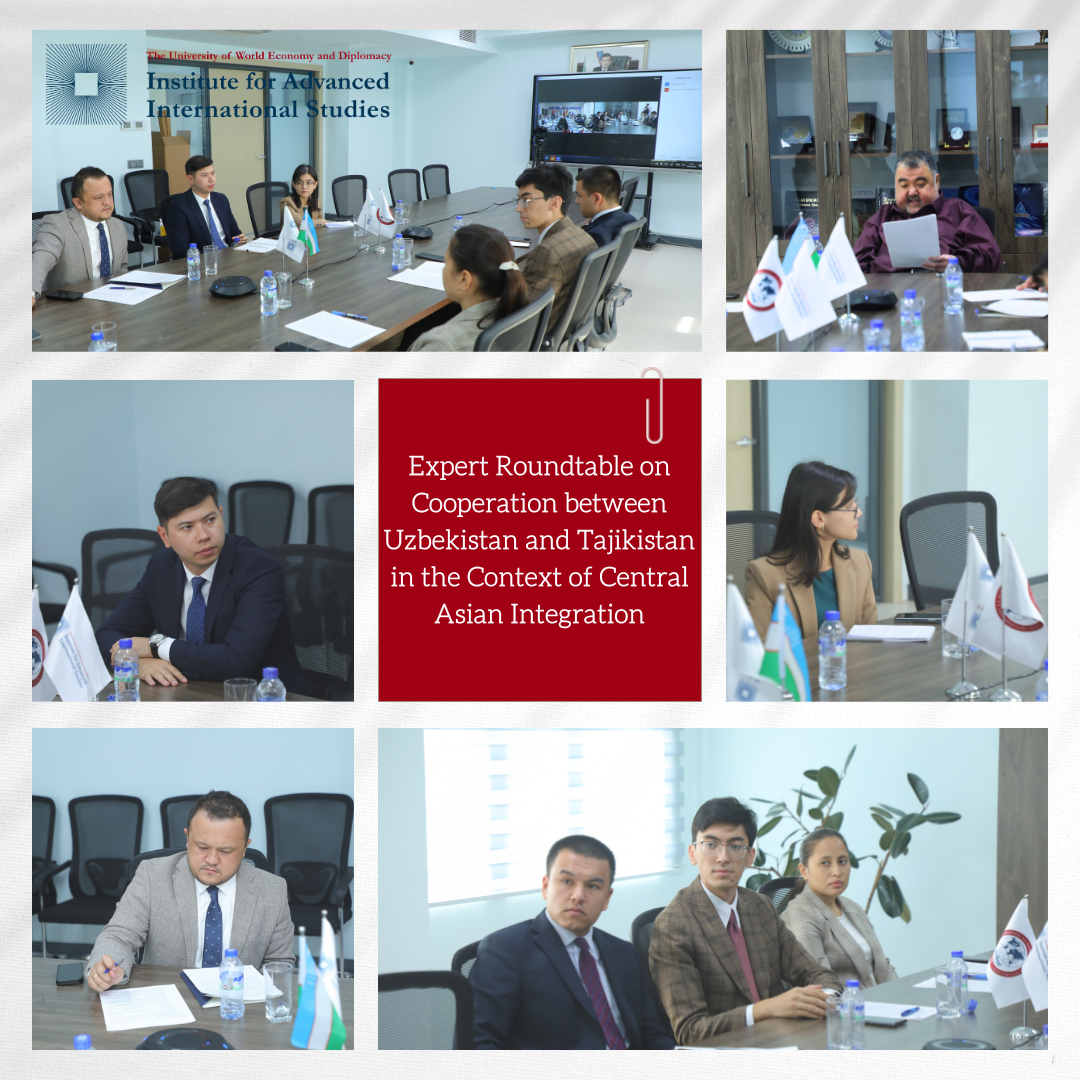
On 27 September 2024, the Research Institute of Political Processes, Diplomacy, and Globalisation of the Academy of Public Administration under the President of the Republic of Tajikistan held a roundtable with the remote participation of the Institute for Advanced International Studies at the University of World Economy and Diplomacy (IAIS UWED). The event focused on discussing the pressing challenges faced by the two countries in light of new geopolitical realities, as well as the development of strategies for further strengthening of bilateral relations.
In his welcoming remarks, Vice-Rector of the Academy, Karamalisho Karamalishoev, emphasised that the implementation of joint scientific and academic initiatives is key to expanding cooperation and fostering closer alliances. In turn, Shakhboz Akhmedov, Deputy Director of IAIS, highlighted the historical significance of the deepening bilateral relations between Uzbekistan and Tajikistan, which are aimed at ensuring regional stability and advancing integration processes in Central Asia.
The event was moderated by Alisher Saidmukhtorov, Director of the Research Institute of Political Processes, Diplomacy, and Globalisation, who set the tone for the discussions by underscoring the importance of deepening political interaction between the two countries. The speakers throughout the roundtable stressed the necessity of strategic partnership, which should serve as the foundation for the future development of the region. The discussions that followed addressed a wide range of issues, including security, economic cooperation, education, and cultural collaboration.
Azamat Seitov, Head of the Centre for Anthropology and Conflict Studies at IAIS, delivered a positive assessment of the new phase of bilateral relations between Uzbekistan and Tajikistan, reflected in the signing of the Treaty of Allied Relations in 2024. He emphasised the importance of political dialogue and expanding partnership initiatives. Saodat Sharifkhojaeva, Dean of the Faculty of Diplomacy and Politics at the Academy of Public Administration, discussed the transformational processes occurring in Central Asia, which are turning the region into an important geopolitical centre. She noted that the successful integration of Central Asian countries depends on the coordination of efforts in response to global changes.
Islomkhon Gafarov, Senior Research Fellow at the Centre for Afghanistan and South Asian Studies at IAIS, presented a report on bilateral cooperation in the field of security, stressing the necessity of coordinated action in the battle against terrorism and the strengthening of border controls, which are critical to maintaining peace in Central Asia. His views were echoed by Naimi Ismoil, Associate Professor of Diplomacy and International Relations at the Academy of Public Administration, who underlined the role of allied relations in addressing security challenges, sustainable development, and regional stability.
In addition to security, experts discussed the economic aspects of bilateral cooperation. Fazliddin Djamalov, Leading Research Fellow at the Centre for American Studies at IAIS, pointed out the significance of economic cooperation on multilateral platforms within Central Asia, as well as the importance of political coordination and aligned strategies to confront the challenges posed by the global economy and international markets. In this context, trade and transport relations were also a focal point of the discussions. Nargiza Umarova, Senior Research Fellow at the Centre for Asia-Pacific Studies at IAIS, highlighted the role of transport infrastructure in strengthening connections between the two countries, emphasising that Uzbekistan and Tajikistan must “collaborate, not compete” in terms of logistics.
The roundtable discussions culminated in the theme of cooperation in education and science. Zukhro Turaeva, Associate Professor of Political Science and Public Relations at the Academy of Public Administration, drew attention to the significant achievements in educational exchanges and joint scientific research. She noted that educational and scientific programmes are a key factor in long-term cooperation between Tajikistan and Uzbekistan, fostering the development of new professionals and the exchange of cutting-edge knowledge. Notably, out of more than 200 bilateral legal agreements, 70 are related to scientific and cultural cooperation.
The roundtable concluded with an active discussion of the outcomes, where participants highlighted that strategic cooperation between Uzbekistan and Tajikistan is one of the key factors for the prosperity and stability of the region. This partnership not only strengthens bilateral relations but also lays the groundwork for the further integration of Central Asian countries into the global political and economic arena.